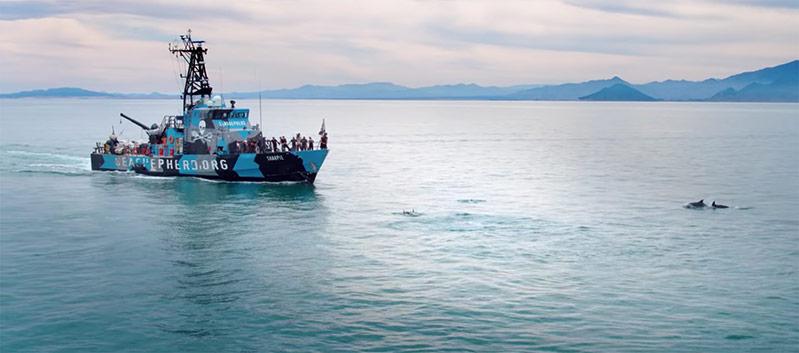It’s well known that animals are disappearing at an alarming rate due to overharvesting, habitat loss, invasive species, pollution, and global climate change. Many people are also aware of the poaching of rhinos for their horns and elephants for their ivory tusks.
But “we’re not as aware of this whole other component that is now in our oceans, in our rivers, on land, it’s everywhere. It’s seeping into all aspects of the wild world,” Cynthia Smith, the executive director of the National Marine Mammal Foundation, said during a telephone conversation.
Dr. Smith was referring specifically to wildlife crime, which she says is now skyrocketing. She knows firsthand, for she is one of the key figures in “Sea of Shadows,” a new National Geographic documentary film directed by Richard Ladkani that the Hamptons International Film Festival will present in an outdoor screening at Gurney’s Montauk on Friday, Aug. 16.
The sea in question is the Sea of Cortez, also known as the Gulf of California, which lies between the Baja Peninsula and Mexico’s west coast. That body of water is home to the totoaba, a six-foot fish whose swim bladder, or fish maw, is thought by the Chinese to have lifesaving properties.
A single bladder may start out in Mexico with a black market value of $4,500 and ultimately fetch $70,000 or more in China. The fish is known colloquially in Mexico as the “cocaine of the sea,” involving as it does the drug cartels in Mexico as well as Chinese traffickers.
But it is not the totoaba that is almost extinct; it is the vaquita porpoise, the smallest and most elusive whale species. “Sea of Shadows,” which has all the drama of a taut suspense film, follows the efforts of four individuals and their teams to save the vaquitas by removing the poachers’ nets, whose purpose is to catch the totoaba but whose secondary effect is the entrapment and destruction of the vaquita, of whom only 15 remain.
One of the key figures in the film is Andrea Crosta, executive director of Earth League International, which uses intelligence and undercover operations to target illegal wildlife traffickers. During the film his team, which includes an ex-F.B.I. agent, surreptitiously records details of the trafficking process after it infiltrates a supply chain that leads them to a Chinese restaurateur in Tijuana.
Carlos Loret de Mola, a well-known investigative journalist in Mexico, leads us into the story through his television coverage of the vaquita crisis. Near the end of the film, Mr. Crosta, as an on-air guest of Mr. de Mola, goes public with the information his team gathered, in part because he doesn’t trust local law enforcement to follow up on it.
Dr. Smith’s team sets out to capture a vaquita in the hope that if the species can survive in captivity its future can be secured. While on patrol one night off the coast, the Vaquita CPR team sees a crew of armed men walking parallel to their boat onshore in an obvious attempt to intimidate them.
“It used to be extremely unusual for us to be faced with security risks while trying to save animals,” she said. “But the illegal wildlife trade has become a greater than $20 billion annual industry, and there are species rapidly disappearing because of it.”
Jack Hutton is a drone operator for the Sea Shepherd Conservation Society, whose Operation Milagro involves the use of nighttime drone photography to locate poachers and pull their nets from the water. The Sea Shepherd vessels have been subject to armed attacks, and tense high-speed chases and the shooting down of a drone punctuate the film.
In one of the most dramatic and, ultimately, saddest sections of the film, the Vaquita CPR team succeeds in catching a vaquita and transporting her to a secure facility. However, in the end she is unable to survive for more than a few moments in captivity, and the rescue operation has to be abandoned.
However, Dr. Smith’s team is still active in the area. “There actually is some good news,” she said. “When we last checked on them, they were still reproducing, and the ones that are alive look great. They have the genetic strength to recover if we can get the nets out of the water and tackle the trafficking issue in a meaningful way.”
The film also elucidates the conflict between the poachers and the legal fishermen of the town of San Felipe, where the supply chain starts. When the government hired some of the legal fishermen to remove nets, neighbors turned against neighbors. After several poachers are arrested, a mob of illegal fishermen riot and seize a navy boat until the prisoners are released.
Dr. Smith said that Mr. de Mola and Mr. Crosta’s television exposé of the traffickers has made a difference. Earth League International provided the Mexican, Chinese, and American governments with intelligence dossiers, and significant totoaba busts in China have seized $150 million in product. “It’s having an impact,” she said, “but there’s a time factor.”
The hope of all the principals is that “Sea of Shadows” will draw enough attention to the crisis that governments and crime fighting agencies will commit resources sufficient to have an impact.
The Aug. 16 screening will take place at 8:30 p.m. and be preceded by a cocktail reception at 6:30. Dr. Smith and David Nugent, the festival’s artistic director, will be present for the event. Tickets are $23 for HIFF members. Those who wish to attend the reception and screening can become members for $50.

